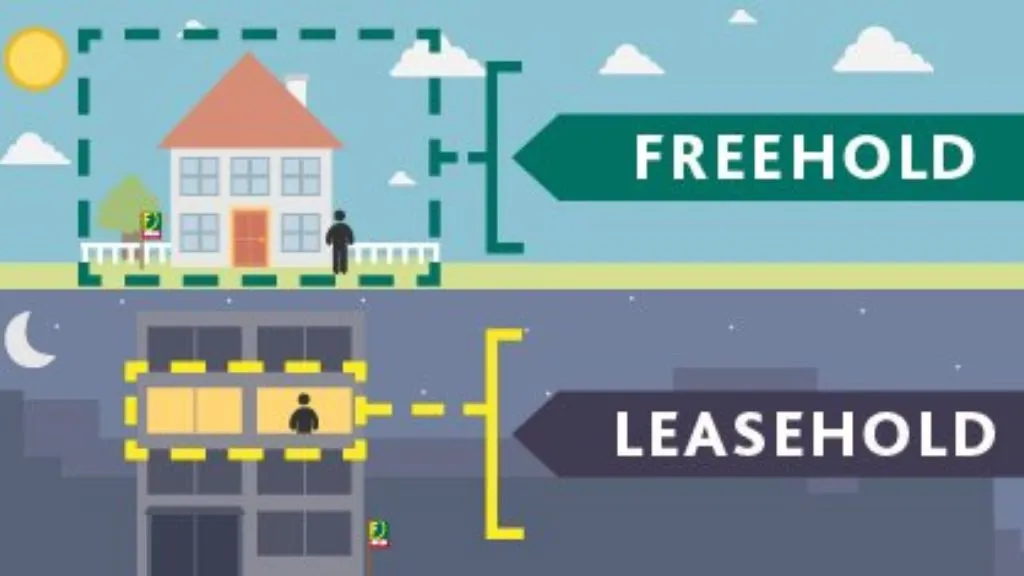Property Geek
We provide the actual and accurate information with unbiased user driven reviews to our viewers, to help them see the best and find the best!
View posts
When investing in real estate, understanding the type of property ownership is crucial. Freehold and leasehold properties are two common forms of ownership, each with distinct characteristics, benefits, and limitations.
A freehold property offers perpetual ownership of both land and structure, while a leasehold property grants rights for a limited period, subject to renewal. Choosing between them can significantly impact your financial goals and property rights.
In this article, we’ll explore the meaning, key differences, comparisons, and the pros and cons of freehold and leasehold properties to guide your decision.
As mentioned above, freehold land refers to a property title by which the landowner owns the property for perpetuity or ‘free from hold.’ In simpler words, the freehold land title ownership has no limit on time for the beneficiaries and landowner.
On the other hand, under the Land Acquisition Law, the government of the state does acquire all rights on all types of private land for the purpose of industrialization, infrastructure facilities of development, and/or urbanization of the private land, after compensating the landowners affected suitably.
| NATURE | LEASEHOLD | FREEHOLD |
| Tenue of ownership | Usually 99 years old or more | No flexible duration unless limited by town planning development |
| Approval for an ownership transfer | Transfer of leases will require permission from the state or governing authority | Transfer of leases without any limitation |
| Rights of the owner | Leasing required from the landlord who has the freehold of the property | The owner has the complete right over the land |

| LEASEHOLD | FREEHOLD |
| The property belongs to the original owner and can be transferred to the investor for a certain period of time | The property is of the owner |
| Investor needs to pay in order to extend the lease | No limit with respect to the ownership |
| The property can be leased if given consent by the state | Needs no legal consent to transfer ownership |
| Finances by the bank might not be possible if the lease is less than 30 years | Bank financial the freehold properties |
| LEASEHOLD | FREEHOLD |
| Related cheaper as compared to the freehold property | The property owners don’t have to pay the pay annual ground net |
| Safer since the land titles are clear and verified | Complete ownership without the restriction of transfer |
| The responsibility lies upon the developer, states, or responsible authority | One is in charge of maintaining the freehold property and does not depend on anyone |
| They are leasehold as the land is owned by the builder. It is extendable if the parties agree | More stable and likely to increase the value in the long run |

A freehold property has no restrictions on the ownership of freehold property, which means it can be inherited. With the absence of encumbrance to the absolute title of the property that transfer can take place by registration of a sale deed.
In order words, when a borrower owns a freehold property they also own the land the property was built on plus the house itself. In the case of an apartment, the owner then becomes a shareholder in the property and you have the right to live in the house as long as you wish for and you can also make changes to it.
In India where most houses are sold as freehold properties, the apartments are sold on lease. Although this is gradually changing since most buyers are confident with purchasing a freehold property.
As per observation, most banks are willing to extend a home loan for a freehold property, as to for the leasehold property. This is as a freehold is considered to be a safer investment, the registration is complete and also expects to increase in value. As a result of which the banks are willing to sanction huge home loans for a freehold property with a high market value, up to 80 percent of the market value.
Here are the pros and cons of a freehold property:
No, it isn’t! Selling or transferring a leasehold property is not difficult, however, you might acquire permission from the concerned authority. Adding on, like a mortgage or loan may not be easily available, the buyers with no financial assistance might opt to avoid such properties altogether, also where the leases are short, it’s harder to transfer/sell.

As per the recent judgment, the Income Tax Appellate Tribunal (ITAT) in Allahabad Bench has allowed tax deduction on the share of freehold conversion charges, stamp duty, etc. for conversion into freehold.
As per the assessee, freehold conversion charges constituted improvement of the property for a better title claiming the same as deductions towards cost improvement of the property and computing long-term capital gains tax. For which, the court ruled the assessee the right to claim the deduction on account for the improvement in the property and on being converted from leasehold Nazul land to freehold property.
The court also agreed to make the property freehold for perfect ownership rights/title in favor of the existing lessees, who’ve been in the position to transfer/sell the property.
Both the Delhi State Industrial and Infrastructure Development Corporation (DSIIDC) have decided to grant ownership of the property (freehold) of factories and plots under the relocation scheme at Bawana Industrial Area. These allottees, especially those who completed five years from the date of allotment with completed construction and have started their factory, are all eligible for this scheme.
Freehold rights allow the owners to take loans directly from banks as compared to them earlier being forced to get loans from the money lenders.